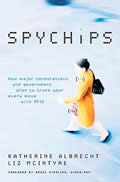Other
McIntyre
Articles:
Coming Soon
HOMELAND SECURITY WANTS TO TRACK SPYCHIPS IN MOVING CARS
By Liz McIntyre & Katherine Albrecht
February
23, 2006
NewsWithViews.com
"Call it Big Brother on steroids," say privacy advocates Katherine Albrecht and Liz McIntyre, co-authors of "Spychips: How Major Corporations and Government Plan to Track Your Every Move with RFID." The U.S. Department of Homeland Security (DHS) is looking for beefed up RFID technology that can read government-issued documents from up to 25 feet away, pinpoint pedestrians on street corners, and glean the identity of people whizzing by in cars at 55 miles per hour.
Radio Frequency IDentification (RFID) is a controversial technology that uses tiny microchips to track items from a distance. These RFID microchips have earned the nickname "spychips" because each contains a unique identification number, like a Social Security number for things, that can be read silently and invisibly by radio waves. Privacy and civil liberties advocates are opposed to the use of the technology on consumer items and government documents because it can be used to track people without their knowledge or consent.
Albrecht and McIntyre have uncovered a Request for Information (RFI) issued by the Department of Homeland Security that underscores these privacy and civil liberties concerns. DHS seeks "superior remote data capture" that "offers significant improvements in performance" over the RFID technology currently being trialed in its U.S. Visit program border security initiatives. The RFI indicates this more potent tracking technology might be used in other initiatives and by other federal agencies.
"While the RFI is directed at border security, we're very concerned the government will use this tracking technology in our driver's licenses," said McIntyre, who is already opposed to the implications of the Real ID Act that passed last spring. That Act gives DHS the power to set uniform national driver's license standards. "Already the Real ID Act creates a de facto national ID since all Americans need a driver's license to participate in modern society," she observed. "Imagine having a remotely readable national ID that can be scanned by the government as you drive by or walk down the street."
A copy of the RFI is posted at the authors' website: www.spychips.com/DHS-RFID.pdf
DHS is seeking RFID devices that "can be sensed remotely, passively, and automatically....The device must be readable under all kinds of indoor and outdoor conditions... and while carried by pedestrians or vehicle occupant."
DHS has set "several high-level goals" for the reading of RFID "tokens" carried by travelers, including:
- The solution must...identify the exact location of the read such as a specific pedestrian or vehicle lane in which the token is read.
- The solution presented must sense the remote data capture technology carried by a pedestrian traveler at distances up to 25 ft.
- The solution presented must sense all tokens carried by travelers seated in a single automobile, truck, or bus at a distance up to 25 ft. while moving at speeds up to 55 mph.
- For bus traffic, the solution must sense up to 55 tokens.
- For a successful read, the traveler should not have to hold or present the token in any special way to enable the reading of the token's information. The goal is for the reader to sense a token carried on a traveler's person or anywhere in a vehicle.
� 2006 - Liz McIntyre - All Rights Reserved
Sign Up For Free E-Mail Alerts
E-Mails are used strictly for NWVs alerts, not for sale
Liz McIntyre is a consumer privacy expert and author of Spychips: How Major Corporations and Government Plan to Track your Every Move with RFID. In this explosive book, McIntyre and co-author Katherine Albrecht reveal how organizations like Procter & Gamble, Gillette, Wal-Mart, and even the U.S. Postal Service plan to use tiny computer chips smaller than a grain of sand to track everyday objects-and even people-keeping tabs on everything you own and everywhere you go.
Katherine Albrecht is a privacy advocate and co-author of Spychips: How Major Corporations and Government Plan to Track your Every Move with RFID. Albrecht has testified on RFID technology before the Federal Trade Commission, the California state legislature, the European Commission, and the Federal Reserve Bank, and she has given over a thousand television, radio and print interviews to news outlets all over the world. Her efforts have been featured on CNN, NPR, the CBS Evening News, Business Week, and the London Times, to name just a few.
Web Sites: SpyChips.com and NoCards.org
E-Mail: liz@spychips.com
The U.S. Department of Homeland Security (DHS) is looking for beefed up RFID technology that can read government-issued documents from up to 25 feet away, pinpoint pedestrians on street corners, and glean the identity of people whizzing by in cars at 55 miles per hour.














